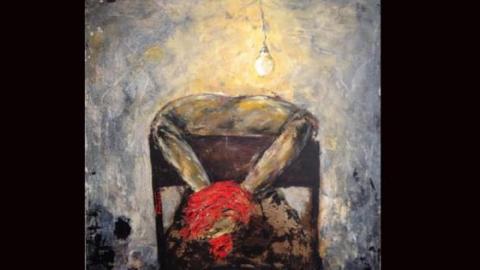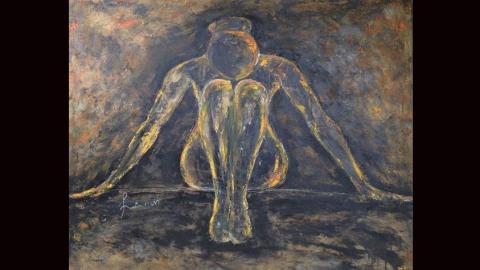Even though all her life she dreamt of a country where justice and equality would prevail, Syrian artist Fadia Affash admits that she did not dare imagine that a revolution could take place in Syria.
Affash, who studied Law to please her family, began studying Art at the Damascus Adham Ismail art institute right after graduating. She never told her family, who believed art was not a career for women. That fear and the difficulty to reconcile social and family expectations with personal dreams and ambitions is at the core of Syrian society and the generational divide, according to the artist. As she said in an interview with Syria Untold, “A group of Syrian children dared do what the older generations could not even dream of. With their graffiti on their school´s wall, they proved that change was possible, and necessary, and started the revolution."

“The revolution changed my life, and the prism through which I see things”, she added. “Now I see the ugliness of humanity in a way I couldn´t see before, but I also see its true light and essence.”
Affash considers Kurdish Syrian artist Adnan Abdel Rahman (who was stripped of his Syrian nationality) crucial in her development as an artist and having a strong impact in her work, which shows concerns for the tragedies suffered by the Kurdish people. After being tutored by him, she followed a Master's program at the National Institute of Public Administration, a higher quality education institute based on the French École nationale d'administration, where she learned research techniques that were absent from Syrian universities.
In 2003, she fulfilled her dream of having an art exhibition, together with her friend and colleague Rim Moussa. It was the first of many exhibitions that would follow, at a national and international level.
Awareness of the situation of women has been at the core of Affash's work. Many of her paintings depict abuses against women, including the so-called “honor crimes”. After the uprising, her work has increasingly focused on the effects of violence and war on women, such as the striking painting called “Black Hole”. In 2010, she collaborated with the Geneva Institute for Human Rights on a film portraying the situation of women in Syria, although the film was never aired.

Among the artist's favorite works is a painting entitled “Transformation”, which she exhibited during Women's Day celebration, on March 8, right before the uprising started spreading throughout the country. “I have a very intimate relationship with this piece”, she explained. “I was hoping for change, and transformation, and that is reflected on the canvas. It was the moment when the revolution grew up in my soul and started spreading through every cell in my body.”
One of her most poignant pieces is the one entitled “Child inside”, which depicts a pregnant woman who was raped in prison. A powerful metaphor of Syria today.
Affash was giving a workshop in Geneva when the Tunisia uprising started. “My heart danced with joy, and I became so excited about the possibility of these popular mobilizations reaching my country.” She then moved to Minnesota, “where I sank into a depression, watching what was happening to my people who had risen against the regime.”
With the help and support of her husband, renowned artist Jihad Abdou, she began painting again. “It was a therapy I needed, and it worked.”
Nowadays, Affash continues to exhibit her work at Los Angeles galleries, to share her pain as a Syrian with the audience in the United States. She is haunted, however, by the feeling of guilt that follows so many Syrians who had to leave the country. “I just paint, how can I say I contributed anything? I don´t know if the guilt I feel for leaving my family and my country under such circumstances will ever ease.”
Among the artists Syria Untold has interviewed, the issue of rebirth with the uprising is a recurrent one. “The revolution gave birth to true artists, I´m very proud of all of them”, Affash said. “Art is not about technique. It´s a struggle, it´s courage.”
Follow Fadia Affash´s work on her official Facebook page.



